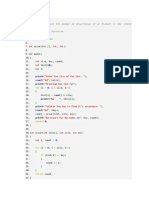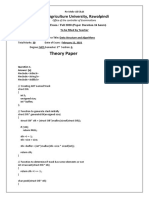Binary Search Tree
Uploaded by
wickykumar05Binary Search Tree
Uploaded by
wickykumar05Write a C program to perform the following operations:
a) Insert an element into a binary search tree.
#include <stdio.h>
#include <stdlib.h>
struct node {
int key;
struct node *left, *right;
};
// A utility function to create a new BST node
struct node* newNode(int item)
{
struct node* temp
= (struct node*)malloc(sizeof(struct node));
temp->key = item;
temp->left = temp->right = NULL;
return temp;
}
// A utility function to do inorder traversal of BST
void inorder(struct node* root)
{
if (root != NULL) {
inorder(root->left);
printf("%d ", root->key);
inorder(root->right);
}
}
// A utility function to insert
// a new node with given key in BST
struct node* insert(struct node* node, int key)
{
// If the tree is empty, return a new node
if (node == NULL)
return newNode(key);
// Otherwise, recur down the tree
if (key < node->key)
node->left = insert(node->left, key);
else if (key > node->key)
node->right = insert(node->right, key);
// Return the (unchanged) node pointer
return node;
}
// Driver Code
int main()
{
/* Let us create following BST
50
/ \
30 70
/\/\
20 40 60 80 */
struct node* root = NULL;
root = insert(root, 50);
insert(root, 30);
insert(root, 20);
insert(root, 40);
insert(root, 70);
insert(root, 60);
insert(root, 80);
// Print inorder traversal of the BST
inorder(root);
return 0;
}
b) Delete an element from a binary search tree.
#include <stdio.h>
#include <stdlib.h>
struct Node {
int key;
struct Node *left, *right;
};
// A utility function to create a new BST node
struct Node* newNode(int item)
{
struct Node* temp = (struct Node*)malloc(sizeof(struct Node));
temp->key = item;
temp->left = temp->right = NULL;
return temp;
}
// A utility function to do inorder traversal of BST
void inorder(struct Node* root)
{
if (root != NULL) {
inorder(root->left);
printf("%d ", root->key);
inorder(root->right);
}
}
/* A utility function to insert a new node with given key in
* BST */
struct Node* insert(struct Node* node, int key)
{
/* If the tree is empty, return a new node */
if (node == NULL)
return newNode(key);
/* Otherwise, recur down the tree */
if (key < node->key)
node->left = insert(node->left, key);
else
node->right = insert(node->right, key);
/* return the (unchanged) node pointer */
return node;
}
/* Given a binary search tree and a key, this function
deletes the key and returns the new root */
struct Node* deleteNode(struct Node* root, int k)
{
// Base case
if (root == NULL)
return root;
// Recursive calls for ancestors of
// node to be deleted
if (root->key > k) {
root->left = deleteNode(root->left, k);
return root;
}
else if (root->key < k) {
root->right = deleteNode(root->right, k);
return root;
}
// We reach here when root is the node
// to be deleted.
// If one of the children is empty
if (root->left == NULL) {
struct Node* temp = root->right;
free(root);
return temp;
}
else if (root->right == NULL) {
struct Node* temp = root->left;
free(root);
return temp;
}
// If both children exist
else {
struct Node* succParent = root;
// Find successor
struct Node* succ = root->right;
while (succ->left != NULL) {
succParent = succ;
succ = succ->left;
}
// Delete successor. Since successor
// is always left child of its parent
// we can safely make successor's right
// right child as left of its parent.
// If there is no succ, then assign
// succ->right to succParent->right
if (succParent != root)
succParent->left = succ->right;
else
succParent->right = succ->right;
// Copy Successor Data to root
root->key = succ->key;
// Delete Successor and return root
free(succ);
return root;
}
}
// Driver Code
int main()
{
/* Let us create following BST
50
/ \
30 70
/\/\
20 40 60 80 */
struct Node* root = NULL;
root = insert(root, 50);
root = insert(root, 30);
root = insert(root, 20);
root = insert(root, 40);
root = insert(root, 70);
root = insert(root, 60);
printf("Original BST: ");
inorder(root);
printf("\n\nDelete a Leaf Node: 20\n");
root = deleteNode(root, 20);
printf("Modified BST tree after deleting Leaf Node:\n");
inorder(root);
printf("\n\nDelete Node with single child: 70\n");
root = deleteNode(root, 70);
printf("Modified BST tree after deleting single child Node:\n");
inorder(root);
printf("\n\nDelete Node with both child: 50\n");
root = deleteNode(root, 50);
printf("Modified BST tree after deleting both child Node:\n");
inorder(root);
return 0;
}
You might also like
- Q1.An Animal Feed Company Must Produce at Least 200 Kgs of A Mixture Consisting of IngredientsNo ratings yetQ1.An Animal Feed Company Must Produce at Least 200 Kgs of A Mixture Consisting of Ingredients13 pages
- Name Roll No Section: - Divyansh Saini - 11813001 - IT-1No ratings yetName Roll No Section: - Divyansh Saini - 11813001 - IT-121 pages
- D1-Practice-Exercise-12 Binary Search TreeNo ratings yetD1-Practice-Exercise-12 Binary Search Tree14 pages
- C program to implement binary search treeNo ratings yetC program to implement binary search tree7 pages
- Searchinbst Binarytreenode Root K Root Null: Bool If Return FalseNo ratings yetSearchinbst Binarytreenode Root K Root Null: Bool If Return False14 pages
- Theory Paper: Arid Agriculture University, RawalpindiNo ratings yetTheory Paper: Arid Agriculture University, Rawalpindi14 pages
- Implementation of Recursive Function For Tree TravNo ratings yetImplementation of Recursive Function For Tree Trav47 pages
- Norm-Based Mechanism Design: Nils Bulling, Mehdi DastaniNo ratings yetNorm-Based Mechanism Design: Nils Bulling, Mehdi Dastani1 page
- Multithreading Interview Questions: Click HereNo ratings yetMultithreading Interview Questions: Click Here37 pages
- 2-Storey With Roof Deck Apartment BuildingNo ratings yet2-Storey With Roof Deck Apartment Building4 pages
- The Transition of Croatian Seaports Into Smart Ports - MIPRO 2019 Saša AksentijevićNo ratings yetThe Transition of Croatian Seaports Into Smart Ports - MIPRO 2019 Saša Aksentijević5 pages
- Information Retrieval Algorithms: A Survey: Prabhakar RaghavanNo ratings yetInformation Retrieval Algorithms: A Survey: Prabhakar Raghavan8 pages
- Products Affected / Serial Numbers Affected:: TP17 212.pdf 08-11-17No ratings yetProducts Affected / Serial Numbers Affected:: TP17 212.pdf 08-11-174 pages
- Q1.An Animal Feed Company Must Produce at Least 200 Kgs of A Mixture Consisting of IngredientsQ1.An Animal Feed Company Must Produce at Least 200 Kgs of A Mixture Consisting of Ingredients
- Name Roll No Section: - Divyansh Saini - 11813001 - IT-1Name Roll No Section: - Divyansh Saini - 11813001 - IT-1
- Searchinbst Binarytreenode Root K Root Null: Bool If Return FalseSearchinbst Binarytreenode Root K Root Null: Bool If Return False
- Theory Paper: Arid Agriculture University, RawalpindiTheory Paper: Arid Agriculture University, Rawalpindi
- Implementation of Recursive Function For Tree TravImplementation of Recursive Function For Tree Trav
- Norm-Based Mechanism Design: Nils Bulling, Mehdi DastaniNorm-Based Mechanism Design: Nils Bulling, Mehdi Dastani
- The Transition of Croatian Seaports Into Smart Ports - MIPRO 2019 Saša AksentijevićThe Transition of Croatian Seaports Into Smart Ports - MIPRO 2019 Saša Aksentijević
- Information Retrieval Algorithms: A Survey: Prabhakar RaghavanInformation Retrieval Algorithms: A Survey: Prabhakar Raghavan
- Products Affected / Serial Numbers Affected:: TP17 212.pdf 08-11-17Products Affected / Serial Numbers Affected:: TP17 212.pdf 08-11-17

























































































